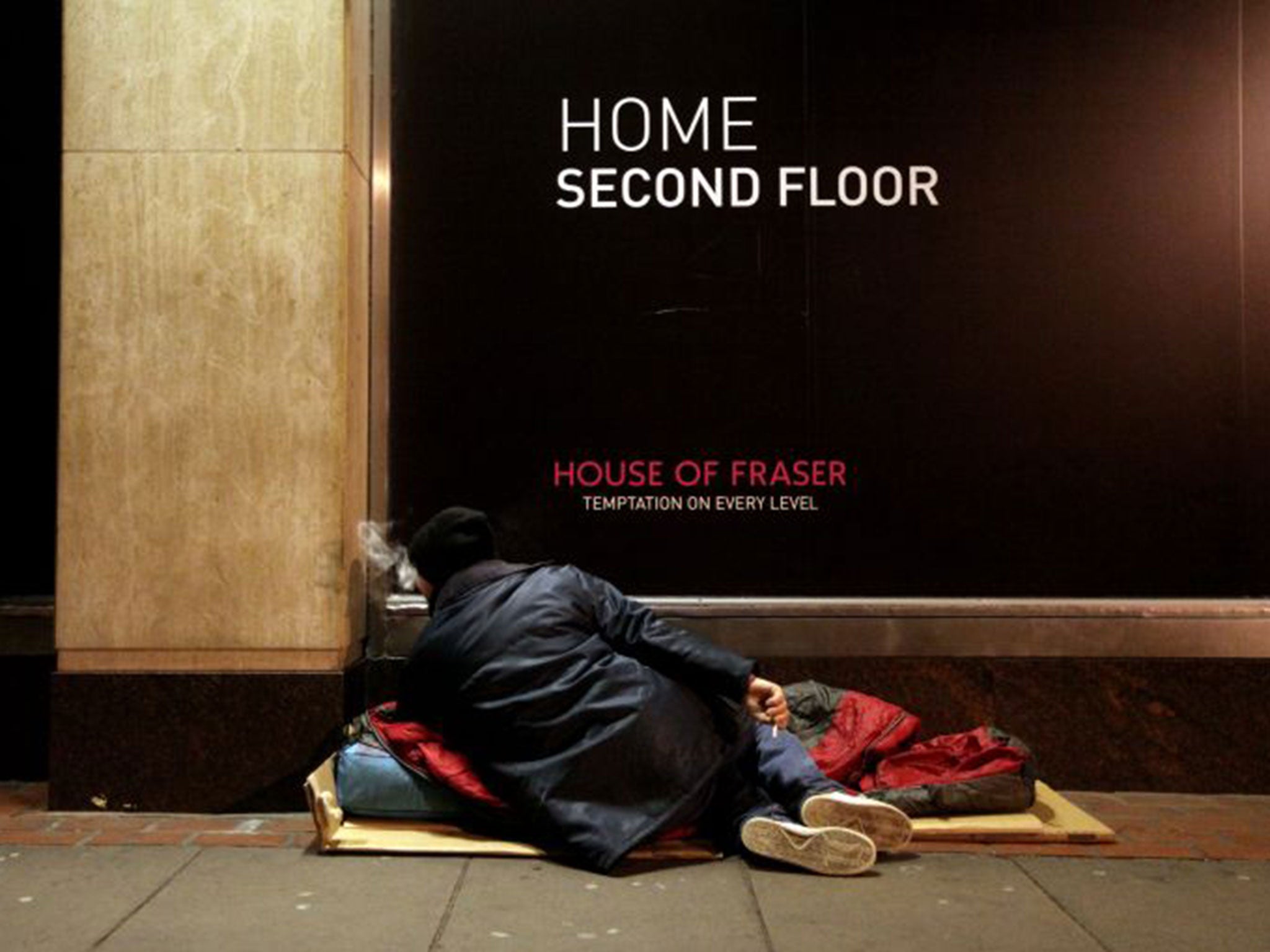Benefit sanctions force people to sleep rough and go hungry, study says
Homelessness charity calls for reform of system it says is leaving vulnerable people who want to work destitute

Benefit sanctions are forcing people to sleep rough, go hungry and push them further away from getting a job, according to one of the most extensive studies of homeless people in Britain.
Crisis, the national charity for single homeless people who commissioned the report, called for reform of a system it said is leaving vulnerable people who want to work destitute instead.
Their findings, based on a survey of more than 1,000 homeless people across 21 cities, revealed almost four in ten people subject to sanctions either had to sleep rough or had become homeless as a result.
The report also said three-quarters (77 per cent) of people had skipped meals, almost two-thirds (64 per cent) had gone without heating and six in every ten people found it harder to look for work. It also discovered 75 per cent of people suffered mental health issues as a result.
The charity said a new system that builds on people’s strengths and aspirations rather than pushing them further away from the labour market is needed.
Their recommendations included taking steps to identify homeless people from day one and suspending sanctions until their housing situation is resolved, the introduction of a new financial assessment to determine beforehand if a sanction is likely to result in destitution or homelessness, in which case it should not be issued, and taking steps to provide tailored support to help homeless people into work.
Report lead author Dr Kesia Reeve, of Sheffield Hallam University, said: “This is one of the most extensive and far-reaching studies of homeless people in Britain, giving them a previously unheard voice in the ongoing debate on welfare reform changes.
“Findings in these 21 cities demonstrate the potentially devastating effect of benefit sanctions, leading to more people on the streets and going hungry. And the impact on people’s mental health and job opportunities is staggering.”
In pictures: Food banks
Show all 9Filmmaker Ken Loach recently called the present system “one of conscious cruelty” and said the public was closing its eyes to the problem.
The Government announced recently that from next year, in a trial scheme, jobseekers would get 14-days’ warning before facing benefit sanctions.
Currently sanctions, which result in the loss of benefits, can be imposed immediately. Work and Pensions Secretary Iain Duncan Smith said they were a “necessary part of the system” but kept under review. Labour’s Frank Field, chairman of the Work and Pensions Select Committee, welcomed the move.
Jon Sparkes, Chief Executive of Crisis, said: “It’s clear that the regime isn’t working for the most vulnerable. The government’s recent proposal for a two week period of appeal doesn’t go far enough. We must make sure that homeless people and those at risk of destitution are identified and protected from an early stage.”
The Crisis report, carried out by the Centre for Regional Economic and Social Research at Sheffield Hallam, revealed numerous examples of people being sanctioned unfairly, including as a result of illness, lack of IT skills, poor literacy or numeracy and administrative errors such as incorrect information or missing letters. One person was sanctioned after her home burned down in an arson attack, and another for missing appointments while he was ill with cancer.
Mr Sparkes said: “Benefit sanctions are a major cause of homelessness and poverty. They’re hitting vulnerable people hardest and preventing them from finding work. Many will be trying to rebuild their lives or coping with trauma or illness. At times like this, losing the support of benefits can be disastrous.”
Shadow Employment minister Emily Thornberry called the report “a damning indictment of a broken sanctions regime”.
“Instead of dealing with the rising benefits bill by tackling low pay and building more affordable homes, the Tories introduced a new regime of benefit sanctions which brought a culture of fear into jobcentres, pushing people into extreme hardship and in many cases out on to the streets,” she said.
A Government spokesman said: “This report is misleading and has inaccuracies. Homelessness is a highly complex issue, and our priority is to ensure that those individuals affected get the right support. That is why the Government has made over £1bn available to prevent and tackle homelessness, and support vulnerable households since 2010.
“We know that the most important thing for homeless people is to get a roof over their head. This is why we make allowances, for example we don’t expect them to be looking for work while they are focused on finding living arrangements. This means that it is highly unlikely that any homeless person would be sanctioned.”
Subscribe to Independent Premium to bookmark this article
Want to bookmark your favourite articles and stories to read or reference later? Start your Independent Premium subscription today.

Join our commenting forum
Join thought-provoking conversations, follow other Independent readers and see their replies